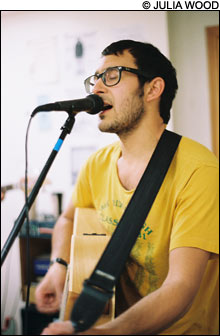
SOMETHING TO SAY Jesse Pilgrim lets it out. |
Jesse Pilgrim and the Bonfire do a couple things pretty well on their debut record, Trial & Error, that are hard to do well: create an album with a sense of place, and create an album with something to say. Combining those attributes makes for a pretty sharp piece of cowpunk and old-time folk that evokes the long musical tradition that manages to link Woody Guthrie to Joe Strummer and Shane MacGowan.Pilgrim likes Portland pretty well — except when he doesn't. Coming just a bit more than half-way through this 11-song, half-hour full-length, "Love/Hate" is in many ways its heart. The distorted and fuzzed out guitar paired with the quick country strum (Pilgrim and Andy Barbo) and walk in the bass (Mica Jones) is pretty indicative of the cow-punk feel record, somewhat akin at times to No Depression, other times more of a mix between Johnny Cash and Soltero's Tim Howard.
On the one hand, Pilgrim refers to Portland as "this godforsaken town." On the other, he notes that if he and his gal left, "we'll both miss our home and have to wipe away our tears." Personally, I'm a Portland fanboy. I can't imagine it being godforsaken in any way. But everyplace sucks when you're unhappy, right? And everyone is unhappy sometimes. The stompy and off-kilter way Pilgrim brings the song to a halt is pretty unhappy-sounding.
Same with the opening and title track, which is ballsy in its take on the Dennis Dechaine case. Trial & Error is actually the title of the book and blog that focuses on Dechaine's innocence (go Google Dechaine and Sarah Cherry if you don't know what I'm talking about) and Pilgrim makes no bones about whom he stands with, finishing the song with "Dennis Dechaine, you should be free/But sadly the judges and courts don't agree."
I'm not educated enough on the case to have an opinion worth putting forth here, but I will say it's nice to see a musician write something political, and not just national big-picture stuff. We need more of this, and we need more acceptance of it as valid material that's not "corny" or "just politics." Putting some importance back in music is a good thing.
"Sawed Off" goes after our state's well-documented prison culture, focusing on an armed robber doing time and who "got stabbed in Warren state pen." Here Pilgrim takes on the prisoner's lament — what if I just didn't do it? Why did I do it? "His mind raced back to being 24/He could have had a wife, and he could have had a son/But he robbed a liquor store with a sawed-off gun." It's fairly punky, but the resonator-sounding guitar and the whining pedal steel effect keeps it grounded.
In addition to the rest of the Bonfire (Derek Gierhan gives the album a reckless feel on drums; Zach Pilgrim is on mandolin and has a piercingly pretty solo on "Whiskey"), Pilgrim also gets help of note from Aly Spaltro and D Gross. Spaltro's verse on the charming, bluegrass-pop "Lead Me Down" is typically self-assured and playful: "Don't you worry/I'll be just fine." Meanwhile, D Gross lends a lilting fingerpick to the old-timey "Now My Darling," which wins for bringing texting into a verse without seeming forced.